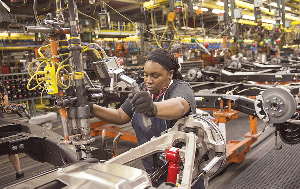The slow growth in Nigeria’s manufacturing sector has persisted, with the sector’s decline extending into the second quarter of 2025 over recent inefficient port operations.
Figures from the National Bureau of Statistics show the manufacturing sector’s real contribution to Gross Domestic Product in Q2 2025 fell 7.81 per cent, down from 9.62 per cent in Q1 2025 and 8.01 per cent in Q2 2024.
The data revealed that the sector grew 1.60 per cent year-on-year, higher than the same quarter of 2024 but 0.47 percentage points and 0.09 percentage points lower than the preceding quarter on an annual and quarterly basis, respectively. Quarter-on-quarter, the sector thinned 15.81 per cent.
The statistics also showed a slump in nominal GDP performance. The sector grew 4.51 per cent year-on-year, a decline of 3.14 percentage points compared to the same period in 2024 and a sharp drop of 37.89 percentage points from the 42.40 per cent recorded in the first quarter of 2025.
On a quarter-on-quarter basis, growth was down 31.72 per cent, with manufacturing contributing only 6.87 per cent to nominal GDP, lower than 7.84 per cent in 2024 and 10.78 per cent in Q1 2025.
Director-General of the Manufacturers Association of Nigeria, Segun Ajayi-Kadir, said manufacturers’ productivity had weakened, worsened by the backlog of uncleared inputs at the ports.
He said, “Domestic manufacturing is still struggling, and more needs to be done by the government to mitigate the decline. I also believe that we should ease the process. We should ease the situation at the port. For the past few weeks, we’ve been encountering challenges with the buildup. People are not able to clear their goods.”
The latest slowdown comes as the sector battles a widening trade deficit. According to the NBS, Nigeria imported N15.39tn worth of manufactured goods in the first half of 2025, compared to exports of N1.09tn, leaving a deficit of N14.3tn.
Although manufactured exports rebounded in the second quarter, rising to N803.81bn, representing a 173 per cent increase from the first quarter and a 67.17 per cent growth year-on-year, stakeholders insist that the pace of recovery remains too weak to offset imports.
The PUNCH reported that Ajayi-Kadir described the deficit as “a confirmation of what we have always said, that domestic manufacturing is still struggling, and that more needs to be done by the government to mitigate this spread that has continued to widen.”
Also, the President of the Lagos Chamber of Commerce and Industry, Gabriel Idahosa, linked the deficit to depleted local capacity. He said, “The N14tn deficit in manufacturing in H1 2025 is due to an imbalance in raw materials as manufacturers look outside because there are insufficient local raw materials.”
Stakeholders have renewed calls on the Federal Government to fast-track the implementation of the Nigeria First policy, which mandates ministries, departments, and agencies to prioritise locally manufactured goods in procurement. They also urged manufacturers to leverage state-level power generation to cushion high energy costs, which continue to weigh on production.
The manufacturing sector, which comprises 13 activities ranging from food and beverages to motor vehicles and assembly, remains a key driver of Nigeria’s industrialisation ambitions. But with declining contributions to GDP and a mounting trade deficit, stakeholders warn that the slowdown could be prolonged unless urgent reforms are implemented.
Business News of Friday, 26 September 2025
Source: www.punchng.com













